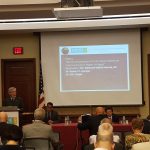By Ms. Elly Page, J.D. –
Legal Advisor – Middle East/North Africa, The International Center for Not-for-Profit Law –
President Abdel Fattah El-Sisi recently approved a new, extremely restrictive law to govern civil society organizations (CSOs) in Egypt. Law 70 of 2017 on Associations and Other Foundations Working in the Field of Civil Work, published in Egypt’s National Gazette on May 24, 2017, is the most repressive law affecting CSOs seen yet in Egypt, containing unprecedented new constraints on organizations’ operations, funding, and independence. It clearly violates provisions of Egypt’s Constitution as well as the nation’s commitments under international law.
Law 70, which replaces the Mubarak-era Law 84 of 2002 on Associations and Foundations, is substantially similar to the draft law approved by Egypt’s Parliament on November 15, 2016. Development of the law was a closed process; at no time were drafts of the law shared with the public or independent civil society organizations for review or consultation prior to its rushed approval. Members of Parliament reported as late as January 2017 that the approved draft law had not been sent to the President, and more than six months elapsed before the President signed the nearly identical Law 70 earlier this week.
Following the enactment of Law 70, organizations of all kinds have one year to register under the Law and comply with its provisions. The most problematic aspects of Law 70 include, but are not limited to, the following:
- Foreign and Domestic Funding: Under Law 70, Egyptian organizations must effectively obtain prior approval from the government before accepting donations and grants from outside Egypt and from foreigners inside Egypt [Article 24]. A newly-created National Agency to Regulate the Work of Foreign Non-Governmental Organizations (“Agency”), comprising representatives of different Ministries as well as security and intelligence officials, has 60 days to approve notifications of pending funds, and if it does not provide approval within 60 days, the request is considered denied [Article 24, 70]. Organizations may not use the funds during the 60-day probationary period. Organizations must publish all information about sources of funding and budgets on their websites and the Ministry of Social Solidarity’s (“Ministry”) website [Article 25]. An organization that accepts foreign funding without receiving approval from the Agency is subject to dissolution by court order [Article 43]. The Law also restricts domestic fundraising from Egyptian individuals or entities; an organization must notify the Ministry thirty days before receiving domestic grants and donations and must receive the Ministry’s approval before it may spend such funds [Article 23].
- Foreign Organizations: Foreign organizations may only operate in Egypt with the prior permission of the Agency [Article 59]. An operating permit for a foreign organization may last a maximum of three years, and cost up to 300,000 Egyptian Pounds (roughly $16,500) – a fee which will increase by 20 percent every five years [Article 59, 61]. Foreign organizations may only engage in activities that align with the government’s development plans, and may not carry out any activities of a political nature, or that “may cause harm to the national security, public order, public morals or public health” [Article 62]. The Ministry may, at its discretion and with the approval of the Agency, freeze the activities of a foreign organization at any time or cancel the organization’s permit if it commits violations of the law. Law 70 provides additional authority to cancel a foreign organization’s permit for reasons “related to any threats to national security, public safety, public order, or in accordance with the principle of reciprocity” [Article 68].
- International Contact: A CSO may not collaborate with, join, or participate in the work of a foreign organization without prior permission from the Ministry. CSOs are also barred from employing foreign workers, or relying on the help of foreign experts or volunteers except with prior government permission [Article 19, 66].
- Formation: Law 70 requires that in order to form, an association must have ten founding members and a physical premise [Articles 1, 7]. All founders and board members of CSOs must have the legal capacity to exercise their civil rights and must never have been convicted of a “misdemeanor or felony related to honor or integrity” unless they have been rehabilitated. The Law also limits the membership of non-Egyptians in an association to 10 percent [Article 5].
- Establishment: Law 70 requires all domestic organizations that do “civil work” (a term commonly used to describe the work of civil society organizations), regardless of their legal form or naming, to reregister under the new law within one year [Preamble Article 2]. It is expressly prohibited for any entity to practice civil work without complying with Law 70. In order to register, organizations must pay a substantial fee of up to 10,000 Egyptian Pounds (roughly $550) [Article 8]. While the Law provides that organizations are registered once they have notified the government, subsequent provisions ensure that the registration process is burdensome and subject to expansive government discretion [Article 9]. In addition, the Ministry can halt the registration process at any time on broad grounds, including if the submitted documents are not proper or if the association’s purposes are criminalized in the Penal Code or “any other law” [Article 9]. Any individual who establishes or works with an unregistered or unauthorized organization is subject to up to five years in prison and a fine of 50,000-1 million Egyptian Pounds (roughly $2,700-$55,000) [Article 87].
- Activities: Under Law 70, all organizations must pursue development and social welfare objectives and must act in accordance with the state’s development plan, needs, and priorities. Organizations are prohibited from “any work of a political nature” or anything that “may cause harm to the national security, law and order, public morals or public health” [Article 13]. Organizations are likewise prohibited from calling for the support of “violence or terrorist organizations.” They are barred from conducting opinion polls and publicizing their results. Additionally, all field research and reports must be reviewed by the Agency and approved prior to their publication [Article 14].
- Government Supervision: Law 70 provides grounds for excessive government interference in numerous aspects of associations’ internal affairs. Ministry representatives are authorized to enter a CSO’s offices to inspect its financial and administrative records, and CSOs are required to accommodate the inspectors [Article 27]. The Law allows the Ministry to contest any decision a CSO makes and request its withdrawal if such decision is deemed to violate the law or the CSO’s bylaws [Article 31]. The Law also deems a CSO’s failure to notify the Ministry of its moving to new premises, receiving or sending money from a foreign source without prior approval, or committing crimes related to the misuse of public funds, as grounds for dismissing the CSO’s board of directors and appointing a temporary one [Article 42]. The Law provides that the Ministry may review any new board members that a CSO proposes and disqualify those it deems ineligible for candidacy [Articles 34].
- Penalties: Law 70 provides number of broad grounds for organizations to be dissolved by court order, including the receipt of foreign funding without appropriate approval or collaborating with a foreign organization without obtaining government permission [Article 43]. It also reinstates individual criminal penalties, including prison terms of at least one year and up to five, as well as a steep fine, for individuals found guilty of, e.g., working with or helping foreign organizations that are not authorized to work in Egypt. Administering field research or surveys without prior permission is subject to up to a year in prison or a fine [Article 87]. In addition to these already unduly-harsh penalties, the Law incorporates by reference any harsher penalty in the Penal Code or “any other law” [Article 86].
Law 70 provides that some areas will be further determined by executive regulations, including the requirements for CSOs to obtain approval for fundraising; rules and requirements for CSOs’ receipt of foreign funds; procedures for foreign organizations to obtain an operating license; and cooperation or affiliation between local and foreign organizations. According to the Law, these regulations are to be issued by the Prime Minister within two months.
Law 70 represents a new, unprecedented step in Egypt’s crackdown on independent civil society organizations, including charities and foreign organizations that could otherwise be providing vital services and assistance during Egypt’s transition. It comes in the context of the government’s shuttering of independent media outlets, arrest of liberal political activists, and imposition of a national state of emergency. Enacting this law gives the Egyptian government even greater legal authority to control and suppress existing civil society organizations, in violation of Egypt’s international legal obligations, while severely discouraging the formation of any new organizations in the future.
________________
http://www.icnl.org/research/monitor/egypt.html





